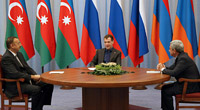When it was the 11th year of commemoration of the terror of October 27 1999 the presidents of Armenia, Azerbaijan and Russia met in Astrakhan. As a result of the meeting the parties adopted a resolution and the Russian president Medvedev made a statement about it. “It is a special resolution on measures to strengthen the trust. The document writes that military hostages and victims should be returned,” said the Russian president and said that the meeting was “humanitarian”. “Be reaffirming the joint statement signed in Moscow on November 2 2008 the president highlighted that the settlement of the conflict through political and diplomatic means requires efforts to strengthen the ceasefire and bilateral trust,” writes the resolution. Certainly the adoption of this document is a very positive thing, especially in consideration of the facts of killings of Armenian soldiers during the past months, even on the threshold of this meeting. Even though the Russian president expressed hope that the presidents of Armenia and Azerbaijan might agree the main principles of Karabakh conflict settlement during the OSCE summit in December, the mentioned document was not so much a “peace” document but it reminds about “technical conditions” of war. It means that the parties have the prejudice that hence there will be killed soldiers and hostages too, which should be returned or the bodies should be given back. Based on Medvedev’s statement we may assume that Russia is at least openly interested in the settlement of Karabakh conflict in the near future. It seems that he wants to settle the conflict in the manner he wants. It means that this kind of solution will not be in the interests of the West, specifically the United States. By an interesting coincidence several hours before the meeting a video was posted in Youtube, in which the US vice president Joe Biden said in answer to a question concerning the recognition of the Armenian genocide by Obama’s administration said that during a phone conversation with president Serzh Sargsyan he asked the US vice president not to press on Turkey while the talks are in process. Such videos are not posted in web sites by chance even in the conditions of the American democracy and these are simple “messages”. Following this video the Armenian president’s office refuted this information, but neither the American government nor the US Embassy in Armenia have commented on this situation. In a word, after the case of “Pzo” this is the second message issued by the US government to the Armenian president. In other words, it is not excluded that Medvedev could be more excited if this video was not posted in the internet. Especially after the presentation of Heydar Aliyev’s monument in Astrakhan it became clear that Russia had done its best to get the consent of Azerbaijan with the expectation to sign any document in case Armenia agrees too. Now we are looking forward to new messages or “hints”.

